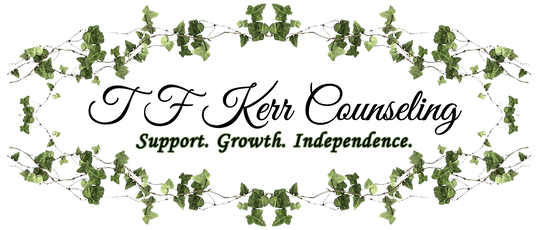top of page

Key Terms
T F Kerr Counseling provides below definitions and helpful explanations for depression, anxiety, alcoholism, and drug addiction.


Depression
Depression is a medical illness that causes a persistent feeling of sadness and loss of interest. Depression can cause both physical and emotional symptoms. Depression affects how you feel, think and behave. You may have trouble doing normal day-to-day activities, and depression may make you feel as if life isn't worth living. More than just a bout of the blues, depression isn't a weakness, nor is it something that you can simply "snap out" of. Depression is a chronic illness that usually requires long-term treatment, like diabetes or high blood pressure.
Common Symptoms and Behaviors Associated With Depression:
Feelings of sadness or unhappiness; Irritability; Angry outbursts or frustration; Loss of interest or pleasure in normal activities; Reduced sex drive; Insomnia or excessive sleeping; Changes in appetite; Agitation or restlessness; Slowed thinking, speaking or body movements; Indecisiveness and decreased concentration; Loss of energy; Feelings of worthlessness or guilt; Trouble thinking, concentrating, making decisions and remembering things; Frequent thoughts of death, dying or suicide; Crying spells for no apparent reason; Unexplained physical problems, such as back pain or headaches.
Anxiety
Anxiety disorder is a serious mental illness. For people with anxiety disorders, worry and fear are constant and overwhelming, and can be crippling. There are many different types of anxiety disorders that include panic disorder, obsessive compulsive disorder, acute stress disorder, post-traumatic stress disorder, social anxiety disorder, specific phobias, agoraphobia and anxiety disorder due to a medical condition, substance-induced anxiety disorder, separation anxiety disorder, generalized anxiety disorder and anxiety disorder not otherwise specified.
Common Symptoms and Behaviors Associated With Anxiety:
Excessive worry, irrational expectations of the worst outcome in many situations; Inability to relax; Feeling apprehensive; Feeling powerless; Having a sense of impending danger, panic or doom; Having an increased heart rate, breathing rapidly, sweating, and/or trembling; Feeling weak or tired, physical symptoms, included but not limited to, muscle tension, headaches, stomach cramps, and frequent urination.

.jpg)


Alcoholism
Alcoholism is a chronic and often progressive disease that includes problems controlling your drinking, being preoccupied with alcohol, continuing to use alcohol even when it causes problems, having to drink more to get the same effect (physical dependence), or having withdrawal symptoms such as nausea, sweating and shaking, when you rapidly decrease or stop drinking. If you have alcoholism, you can't consistently predict how much you'll drink, how long you'll drink, or what consequences will occur from your drinking.
Common Symptoms and Behaviors Associated With Alcoholism:
An inability to limit the amount of alcohol you drink; Having a strong need or compulsion to drink; Developing tolerance to alcohol so that you need more to feel its effects; Drinking alone or hiding your drinking; Physical withdrawal symptoms (nausea, sweating and shaking); Not remembering conversations or commitments (sometimes referred to as a black out); Making a ritual of having drinks at certain times and becoming annoyed and/or irritable when this ritual is disturbed or questioned; Keeping alcohol in unlikely places at home, at work or in your car; Drink to feel "normal"; Have legal problems or problems with relationships, employment or finances due to drinking; Loss of interest in activities and hobbies that used to bring you pleasure.
Drug Addiction
Drug Addiction is a dependence on an illegal drug or a medication that causes compulsive drug seeking habits and use, despite harmful consequences to the addicted individual and to those around him or her. A person addicted to drugs struggles with intense cravings to use as a result of changes in the brain that have occurred since using.
Common Symptoms and Behaviors Associated With Drug Addiction:
Sudden change in behavior; Mood swings - irritable and grumpy and then suddenly happy and bright; Withdrawal from family members; Careless about personal grooming; Feeling that you have to use the drug regularly (daily or several times a day); Failing in your attempts to stop using the drug; Making certain that you maintain a supply of the drug; Spending money on the drug, even though you can't afford it; Doing things to obtain the drug that you normally wouldn't do, such as stealing; Feeling that you need the drug to deal with your problems; Driving or doing other risky activities when you're under the influence of the drug; Focusing an excessive amount of time and energy on getting and using the drug.


bottom of page
.png)